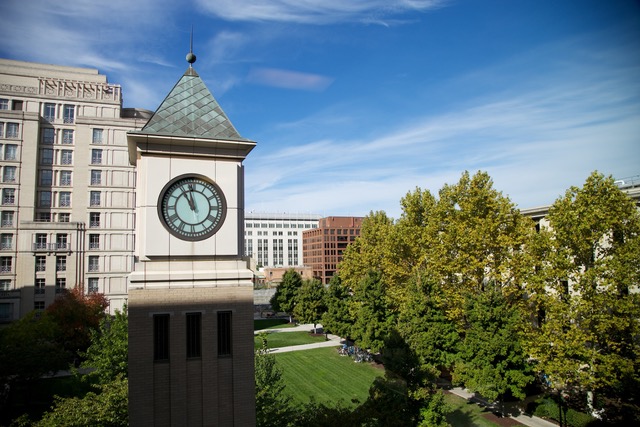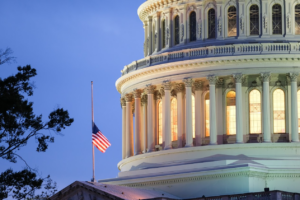A future generation of lawyers is preparing to grapple with issues of police brutality and reform.
Georgetown Law held a three-part series of panels between June 11 and 24 discussing police reform in light of mass protests in response to the killing of George Floyd by Minneapolis officers.
The series, “Rethinking Policing: Activism and Reform,” was designed to start conversations regarding the role of police in maintaining public safety and what approaches for reform may be necessary to prevent police violence. The panels discussed the meaning and strategies behind police reform, how activists can help promote police reform, and the desirability of police abolition.
The first panel, “Transforming the Police,” introduced concepts and questions related to police reform, including the role of police departments themselves in pushing for change.
Georgetown Law Professor Christy Lopez explained that police reform is a broad term that encompasses a variety of methods for changing law enforcement behavior. “The term police reform means different things to different people and has meant different things across time,” she said. “When I use the term police reform, what I’ve always meant by it is something that will change officer conduct on a broad scale.”
Lynda Garcia, director of the Policing Program at The Leadership Conference on Civil and Human Rights, listed the creation of a federal standard for the use of force, a ban on no-knock warrants, and an officer misconduct database as examples of reform that some activists have demanded.
Speakers also identified key areas where they believed changes were necessary, such as the decentralized nature of policing. Ronald Davis, former director of the Department of Justice’s Office of Community Oriented Policing Services, explained that decentralization in policing refers to the lack of national standards of conduct for law enforcement officers that allows state and local governments to create disparate rules for officers.
“We need policing to be a profession,” he said. “When you have a profession, it means you have national adherence to a body of standards. If you don’t meet those standards, you can be disbarred.”
“As a police chief, I can come up with a program that is not evidence-based, that causes damage to the community, and there is no decertification or disbarment for me,” he added.
Executive Director of the Professional Development Bureau of the Metropolitan Police Department Marvin Haiman argued that reform efforts should include shifting the issues officers are expected to respond to, such as mental health crises. “Police are asked to do many things that frankly are out of the scope of the responsibility of police. But in absence of other government or nonprofit or other social services available, law enforcement is who is expected to respond,” Haiman said. “It’s a question of how you invest in other social services that are needed.”
The second panel, “Preparing the Next Generation: Activism and Healing,” discussed how activists should approach systemic police violence.
Racial justice advocate Janae Staicer (LAW ’20) said that there is no single approach to engaging the movement for police reform, pointing to bail fund donations and pro bono legal work as examples.
“It’s not just protesting. It’s not just the people in the streets who are organizing and making demands. There are so many different ways we can go about this because the way it’s most effective is happening from all different angles.”
Executive Director of the Advancement Project’s national office Judith Browne Dianis also noted the importance of collaboration between lawyers and social movement organizers. “When you look back to the role that lawyers played during the civil rights movement, people were not just in the courts on their own. There was a movement that was happening and they were part of that movement,” she said.
“The moment that we’re in now requires us not only to be vigilant, but as lawyers, as law students, to be connected to movements in ways that surround building power.”
Panel members also argued that activism should be led by people affected most by police violence. Georgetown Law professor Anthony Cook explained that social movements should be organized around community demands.
“It’s necessary that we start thinking of social movements as a bottom-up process,” he said. “Change in our society has most often and consistently come from a ground-up approach. The solutions, the recommendations, the policies, and the laws need to also be bottom-up.”
The final panel “Police Abolition: What Does it Mean?” discussed the meaning of abolition and what a society without police or prisons might look like.
Tahir Duckett (L ’17), an associate at civil rights law firm Relman Colfax, explained what he believes abolition means in the context of policing. “Police abolition is not just a destination; it’s a project,” he said. “It starts with the recognition that police and prisons have failed to do what they claim to do; that they don’t actually keep us safe and in fact have been the source of immeasurable harm.”
“Abolition is about having the imagination and courage not to settle for cages and state violence as the only ways in which we can keep each other safe and hold each other accountable,” he added.
Howard Law Professor Justin Hansford (L ’07) emphasized the importance of the historical precedent for police abolition. “It’s imperative that we look at it [police abolition] as coming from a tradition. It’s not something that activists invented in 2020,” he said.
The panel also explained how abolition could respond to problems such as violent crime. Duckett argued that police officers often fail to address these problems, leaving many cases of homicide and sexual assault unsolved. “Even when they [police] are working on crime, it’s far from clear that they’re the most effective way of handling the problem,” Duckett said.
“When people ask me ‘what are we going to do about murderers?’ I want to ask them, well what are we doing about them right now?” he said.







